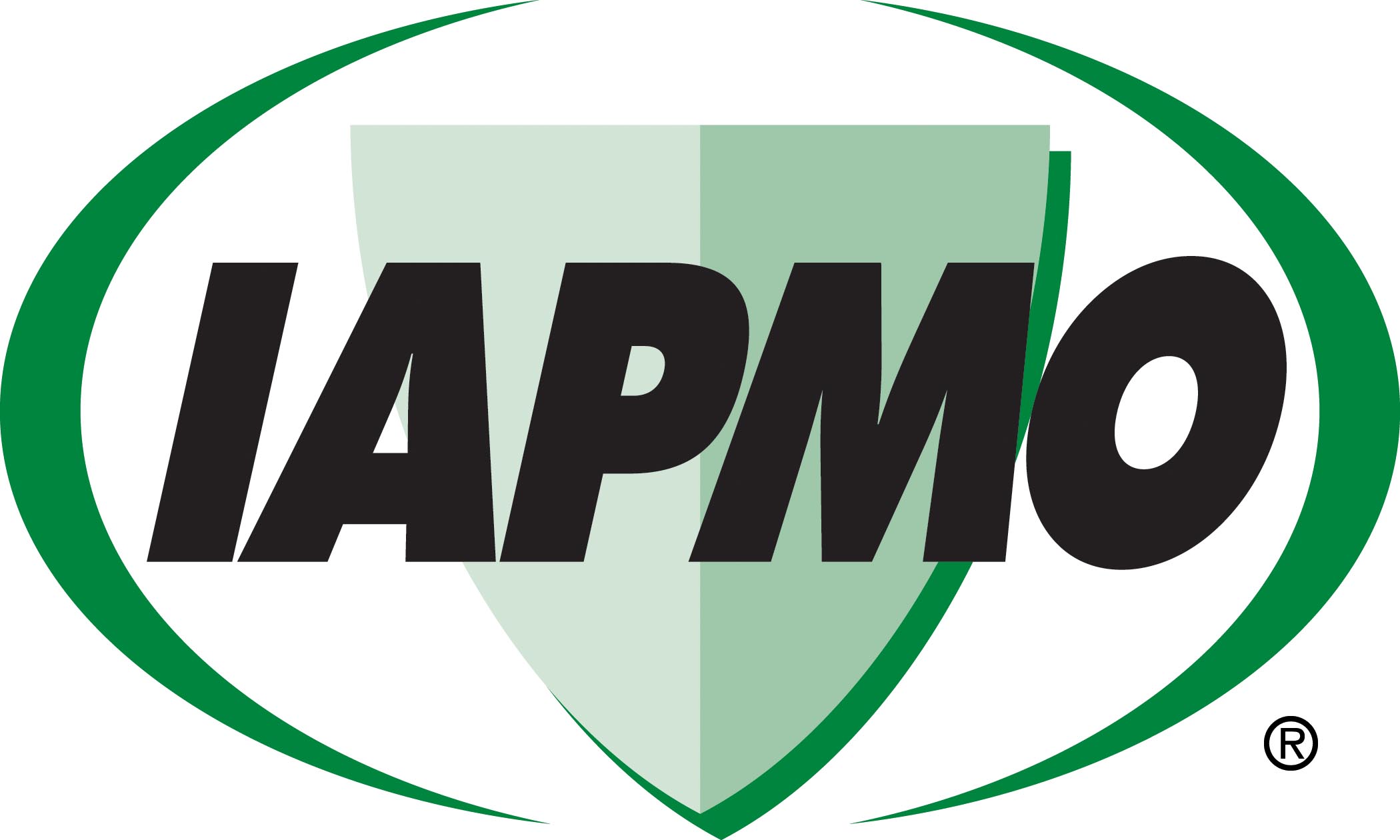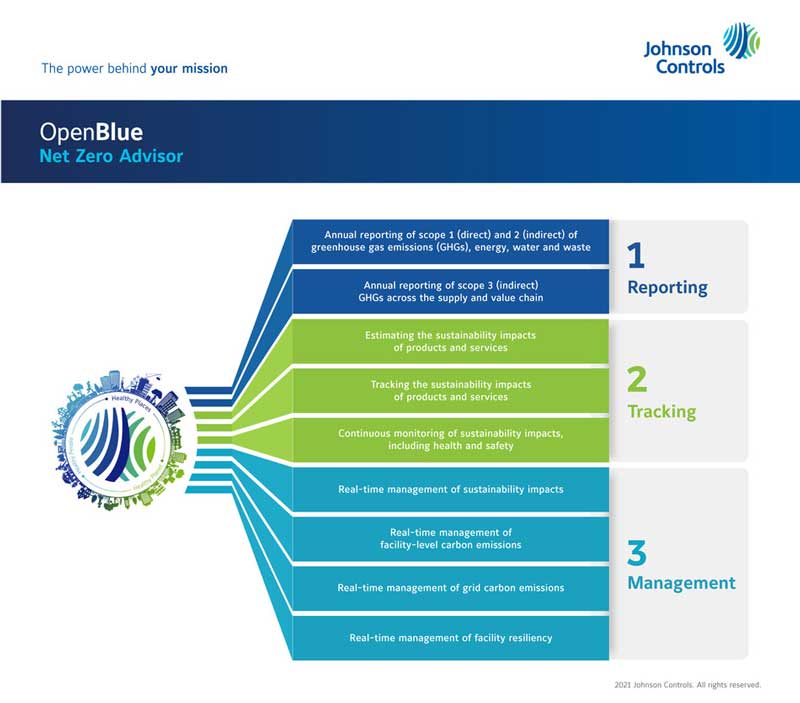Johnson Controls (NYSE: JCI), the global leader for smart, healthy and sustainable buildings, today announced OpenBlue Net Zero Buildings as a Service. Johnson Controls will provide a one-stop shop for companies looking to achieve net zero carbon and renewable energy goals. The offering recognizes customers’ need for assistance in making these goals easier to plan, execute, track and achieve.
“The need for making net zero leadership easier to achieve is immediate and greater than ever. Buildings represent about 40% of global emissions and Johnson Controls is uniquely positioned to help customers around the world pursue their net zero carbon goals,” said George Oliver, chairman and CEO of Johnson Controls. “Our proprietary research echoes the demand, prioritization and urgency for support that businesses, governments and global leaders are calling for. Our As a Service model looks to provide our customers with guaranteed outcomes and risk management models to achieve emission reduction commitments that ultimately lead to healthier buildings, people, places and the planet.”
To ensure alignment with the needs of customers and prospects, in May 2021, Johnson Controls commissioned a survey of 1,046 North American professionals responsible for building operations, facilities management and energy & sustainability management across various industry verticals and building types. Over 90% of respondents have significant goals to reduce carbon emissions and energy consumption by 2030+ with over 60% of respondents targeting a 50% or greater reduction. Goals include increasing building performance and value, positively impacting the surrounding community and talent attraction and retention.
The OpenBlue Net Zero Buildings as a Service portfolio includes a full spectrum of sustainability offerings tailored to schools, campuses, data centers, healthcare facilities as well as commercial and industry players. Understanding the market trends, unique industry requirements and investment pitfalls is an important element in making large sustainability decisions. Johnson Controls helps customers stay abreast of important trends and technology innovations that feed into a customized roadmap highlighting opportunities and managing risks and uncertainties against a rapidly changing regulatory environment.
Additional results from the Johnson Controls survey revealed that respondents’ top five solution pathways and also their drivers for sustainability and net zero lean into As-a-Service capabilities, including improving energy efficiency, integrating onsite renewables, electrifying buildings, incorporating offsite renewables and adding grid interactive capabilities. However, almost all respondents are facing challenges across these solution pathways while also feeling pressure to move quickly. Over 90% of respondents plan to pursue a LEED certification and yet run into challenges with measuring emissions, the largest being how to aggregate data from multiple sources. Digital solutions are needed to solve this and other measurement challenges.
Supporting this need, Johnson Controls has created a game-changing new offering called OpenBlue Net Zero Advisor. It will deliver real-time, AI-driven tracking and reporting of sustainability metrics, helping facilities managers ensure and prove the net zero carbon reduction and renewable energy impact of their buildings. Based on criteria such as LEED certification, the new technology automatically gathers and analyzes data about energy, water, materials and greenhouse gas emissions involved in every phase of a building`s lifecycle and proves CO2 reductions, renewable energy and efficiency gains. This will generate energy and environmental outcomes from improving building operations.
Johnson Controls suite of connected sustainability solutions and services is offered through flexible risk sharing models that enable tailored deal structures where end users pay for expected outcomes rather than assets. Through options for simple, fixed-fee models, Johnson Controls takes on the responsibility for upfront capital decisions, design and construction, and decarbonization goal achievement and reporting.
“The need and demand for a 360-degree net zero carbon solution is clear. Businesses, governments and global coalitions have all set ambitious sustainably goals over the next two decades, with many aspiring for decarbonization by 2030,” said Katie McGinty, vice president & chief sustainability, government and regulatory affairs officer at Johnson Controls. “We offer a unique service and partnership model that allows customers to focus on their industry core competencies and revenue-generating activities while we drive customized steps for planning, execution and reporting that flex to the specific needs of each sustainability journey.”
Joining hands with like-minded thought leaders in sustainability is showing strong impact already as Johnson Controls partners with customers, leading technology companies, research institutions and government entities to build innovative solutions in pursuit of net zero carbon.
- The Dubai Electricity and Water Authority (DEWA) headquarters becomes the tallest, largest, and smartest net zero energy government building in the world
- DEWA has partnered with Johnson Controls and Microsoft to implement the latest digital twin technologies, the Internet of Things, cybersecurity, Artificial Intelligence, and smart building management solutions in DEWA’s new headquarters, called Al Shera’a (Arabic for sail). Once complete, the partnership enhances the tallest, largest and smartest net zero-energy government building with net zero carbon emissions in the world. The total energy used in the building during a year will be equal to or less than the energy produced on-site. Through innovative technologies, Al-Shera’a is expected to utilize up to 50% less water than comparable buildings. This undertaking is the latest development in Johnson Controls’ ongoing commitment to reimagine the performance of buildings to serve people, places, and the planet.
- DEWA has partnered with Johnson Controls and Microsoft to implement the latest digital twin technologies, the Internet of Things, cybersecurity, Artificial Intelligence, and smart building management solutions in DEWA’s new headquarters, called Al Shera’a (Arabic for sail). Once complete, the partnership enhances the tallest, largest and smartest net zero-energy government building with net zero carbon emissions in the world. The total energy used in the building during a year will be equal to or less than the energy produced on-site. Through innovative technologies, Al-Shera’a is expected to utilize up to 50% less water than comparable buildings. This undertaking is the latest development in Johnson Controls’ ongoing commitment to reimagine the performance of buildings to serve people, places, and the planet.
- The Powerhouse Alliance builds the world’s northernmost energy-positive building
- The Powerhouse Alliance, a 10 year old Norwegian collaboration for innovation in energy, wanted to build a net zero energy smart building that would serve as a leading example for the northern hemisphere. Johnson Controls helped design a complete energy system that harvests twice the energy of the building’s annual consumption and draws heating and cooling energy from the ocean while sharing it with the building and other surrounding structures. Further, low energy building devices, such as LED lighting and VAV HVAC systems were installed. All systems are tracked on a digital dashboard that details occupancy, comfort and sustainability KPIs in given building zones. Today, the Powerhouse Brattørkaia building in Trondheim produces more electricity than it consumes daily and supplies renewable energy to itself, its neighboring buildings, electric buses, cars and boats through a local microgrid.
- The Powerhouse Alliance, a 10 year old Norwegian collaboration for innovation in energy, wanted to build a net zero energy smart building that would serve as a leading example for the northern hemisphere. Johnson Controls helped design a complete energy system that harvests twice the energy of the building’s annual consumption and draws heating and cooling energy from the ocean while sharing it with the building and other surrounding structures. Further, low energy building devices, such as LED lighting and VAV HVAC systems were installed. All systems are tracked on a digital dashboard that details occupancy, comfort and sustainability KPIs in given building zones. Today, the Powerhouse Brattørkaia building in Trondheim produces more electricity than it consumes daily and supplies renewable energy to itself, its neighboring buildings, electric buses, cars and boats through a local microgrid.
- Colorado State University (CSU) – Pueblo becomes first 100% solar-powered battery storage university in Colorado
- CSU-Pueblo is the first university in its state to reach “net zero electric” efficiency, which means the solar panels will provide 100% net solar production for academic buildings on the campus. Johnson Controls installed a 23-acre solar farm with battery storage that supplies 12M kilowatt hours (kWh) of electricity. Electricity rates change often making it challenging for organizations to budget their energy spend. With this microgrid solution, CSU-Pueblo has locked in its electricity costs for the next 25 years.
- CSU-Pueblo is the first university in its state to reach “net zero electric” efficiency, which means the solar panels will provide 100% net solar production for academic buildings on the campus. Johnson Controls installed a 23-acre solar farm with battery storage that supplies 12M kilowatt hours (kWh) of electricity. Electricity rates change often making it challenging for organizations to budget their energy spend. With this microgrid solution, CSU-Pueblo has locked in its electricity costs for the next 25 years.
- The National University Singapore contributes actively to standardized model for data labels in buildings
- The National University of Singapore (NUS) and Johnson Controls formed a joint collaboration on smart buildings research. Researchers at the NUS School of Design and Environment leveraged the Johnson Controls OpenBlue Innovation Center housed on the campus to drive machine learning research to accelerate the conversion of Internet of Things data into the BRICK Schema, a standardized model for data labels in buildings. This open-source schema describes smart buildings and their subsystems in a format that enables software to more easily and quickly connect into a larger number of buildings. As a result, a consistent schema across buildings supports better understanding of metadata usage across all building types, improving overall sustainability and operational efficiency. This paves the way for greater use of AI in building management and autonomous buildings.
To learn more about OpenBlue Net Zero Buildings as a Service, visit: https://www.johnsoncontrols.com/openblue/net-zero-buildings
To download the survey results as well as the methodology, visit: https://www.johnsoncontrols.com/insights/2021/thought-leadership/open-blue-net-zero-buildings-pulse-survey
To read more about Johnson Controls POV on why companies benefit from a single strategy for sustainability and digitalization, visit: https://www.johnsoncontrols.com/insights/2021/white-paper/the-case-for-unifying-sustainability-and-digitalization-strategies
At Johnson Controls (NYSE:JCI), we transform the environments where people live, work, learn and play. As the global leader in smart, healthy and sustainable buildings, our mission is to reimagine the performance of buildings to serve people, places and the planet.
With a history of more than 135 years of innovation, Johnson Controls delivers the blueprint of the future for industries such as healthcare, schools, data centers, airports, stadiums, manufacturing and beyond through its comprehensive digital offering, OpenBlue. With a global team of 100,000 experts in more than 150 countries, Johnson Controls offers the world’s largest portfolio of building technology, software as well as service solutions with some of the most trusted names in the industry. For more information, visit www.johnsoncontrols.com or follow us @johnsoncontrols on Twitter.

IAPMO
IAPMO develops and publishes the Uniform Plumbing Code®,the most widely recognized code of practice used by the plumbing industry worldwide; Uniform Mechanical Code®; Uniform Swimming Pool, Spa and Hot Tub Code®; and Uniform Solar Energy, Hydronics and Geothermal Code™ — the only plumbing, mechanical, solar energy and swimming pool codes designated by ANSI as American National Standards — and the Water Efficiency Standard (WE-Stand)™. IAPMO works with government, contractors, labor force, and manufacturers to produce product standards, technical manuals, personnel certification/educational programs and additional resources in order to meet the ever-evolving demands of the industry in protecting public health and safety.
Last modified: December 30, 2022

